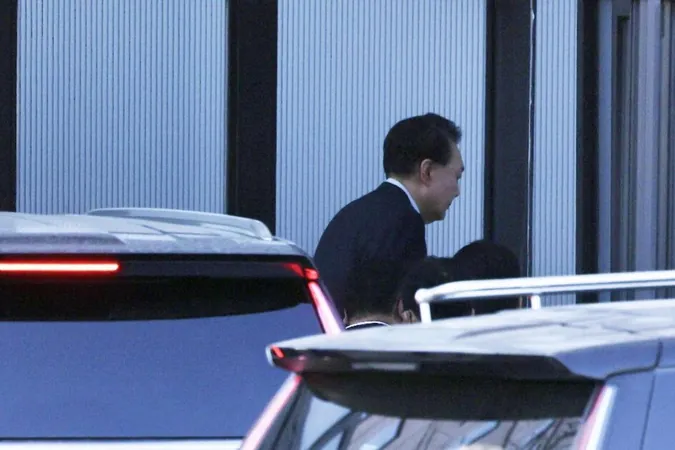
Shocking Arrest of South Korean President Yoon Sparks Unprecedented Political Crisis
2025-01-15
Author: Wei Ling
SEOUL - In a historic and controversial move, South Korean President Yoon Suk Yeol has been arrested and questioned by authorities on January 15 as part of a criminal insurrection probe.
This marks the first time in South Korea's democratic history that an incumbent president has faced such legal action, sending shockwaves through the nation's vibrant political landscape.
Yoon's Arrest and Subsequent Actions
Yoon's arrest follows his impeachment by lawmakers and his brief declaration of martial law on December 3. Lawmakers voted to remove him from office on December 14, leading him to take refuge in his hillside residence under heavy security.
However, more than 3,000 police officers, determined to apprehend him, surrounded his residence early in the morning on January 15, prompting Yoon to concede and comply with questioning to avoid potential bloodshed.
Yoon's Response to the Investigation
Yoon referred to the investigation by the Corruption Investigation Office for High-ranking Officials (CIO) as 'illegal' yet expressed a desire to cooperate in order to prevent violence during the process.
Upon being escorted from his home—often referred to as Seoul's Beverly Hills—to the austere CIO offices, he reportedly avoided the media by slipping in through a back entrance.
Interrogation Process and Political Reactions
Investigators now have 48 hours to question Yoon, with the possibility of seeking a warrant for further detention for up to 20 days. Reports suggest that Yoon has remained tight-lipped, refusing to be recorded on video during the questioning.
Following a simple dinner, the interrogation will continue, although late-night questioning has yet to be decided.
Political Analysts and Local Reactions
Political analysts and local party leaders are closely watching the unfolding events. Democratic Party floor leader Park Chan-dae has expressed that Yoon's arrest signals that 'justice in South Korea is alive,' citing it as a step towards restoring constitutional order and democracy.
In contrast, Yoon's legal team contended that the arrest warrant was based on incorrect jurisdiction, seeking to challenge the ongoing investigation.
Martial Law Declaration and Public Sentiment
Critically, Yoon’s recent declaration of martial law has sparked widespread unrest and controversy. His actions have raised significant concerns among citizens, given South Korea's historical commitment to democratic principles.
The United States has stated that it remains committed to engaging with the current South Korean government amid these turbulent times, as officials in Japan express serious interest in the developments unfolding next door.
Public Support and Political Dynamics
Supporters of Yoon gathered outside his residence, rallying for his defense, with some drawing parallels to U.S. political scenarios, particularly referencing former President Donald Trump's claims of election fraud.
Despite significant public disapproval of Yoon's martial law at large, there is a resurgence of support for his People Power Party (PPP) which has recently gained traction in the polls.
Poll Results and Future Implications
In the latest Realmeter survey, supported by political data, the PPP's popularity stood at 40.8%, closely trailing the opposition Democratic Party's 42.2%.
The political dynamic remains charged as both the CIO investigation and the Constitutional Court's deliberations on his impeachment continue to unfold—a narrative that will likely shape South Korea's democratic future.
Conclusion
As the nation watches closely, the repercussions of Yoon's arrest could have profound and lasting effects on South Korea's political landscape, raising questions about the balance of power in a country rich with democratic ideals and a complex history of political upheaval.
Will Yoon's claims of election fraud stoke further unrest or will the investigation establish new legal precedents in South Korea's governance? Only time will tell.

 Brasil (PT)
Brasil (PT)
 Canada (EN)
Canada (EN)
 Chile (ES)
Chile (ES)
 Česko (CS)
Česko (CS)
 대한민국 (KO)
대한민국 (KO)
 España (ES)
España (ES)
 France (FR)
France (FR)
 Hong Kong (EN)
Hong Kong (EN)
 Italia (IT)
Italia (IT)
 日本 (JA)
日本 (JA)
 Magyarország (HU)
Magyarország (HU)
 Norge (NO)
Norge (NO)
 Polska (PL)
Polska (PL)
 Schweiz (DE)
Schweiz (DE)
 Singapore (EN)
Singapore (EN)
 Sverige (SV)
Sverige (SV)
 Suomi (FI)
Suomi (FI)
 Türkiye (TR)
Türkiye (TR)
 الإمارات العربية المتحدة (AR)
الإمارات العربية المتحدة (AR)